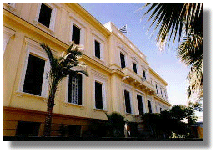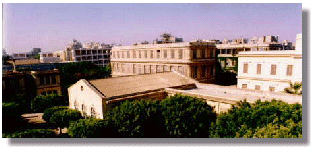Home
Introduction
In English
In Greek
The Founding of EKA and its history
to the end of the 19th Century
In English
In Greek
EKA in the 20th century
In English
In Greek
EKA today
In English
In Greek
Past Presidents and Committee members of EKA
In English
In Greek
The Alexander the Great Centre of Post-Graduate Studies and Research
 Sadly, the Hellenic community of Alexandria has dwindled to a mere 800 and many of the businesses, clubs, hospitals and schools have closed, but many of the churches and grand neo-classical buildings remain.
Sadly, the Hellenic community of Alexandria has dwindled to a mere 800 and many of the businesses, clubs, hospitals and schools have closed, but many of the churches and grand neo-classical buildings remain.
The Orthodox Patriarchate of Alexandria and All Africa has its historical base in Alexandria where it was founded by the Apostle St. Mark in 63 AD. The Patriarchate is responsible for the spiritual and religious well-being of some 150,000 Greeks living in Africa as well as a further 500,000 of the Orthodox Christian faith throughout the region.
 The Hellenic Community of Alexandria (EKA) aims to ensure the best possible opportunities and conditions for the continuation of Hellenism in Egypt and cultivate cultural exchange between Greece and Egypt. To this end EKA proposes the foundation and operation of a School of Archaeological and Classical Studies bearing the name "Alexander the Great", within the buildings of the last Greek Quarter of Chatby, Alexandria - an area of 40,000 square metres, entirely owned by the Hellenic Community of Alexandria.
The Hellenic Community of Alexandria (EKA) aims to ensure the best possible opportunities and conditions for the continuation of Hellenism in Egypt and cultivate cultural exchange between Greece and Egypt. To this end EKA proposes the foundation and operation of a School of Archaeological and Classical Studies bearing the name "Alexander the Great", within the buildings of the last Greek Quarter of Chatby, Alexandria - an area of 40,000 square metres, entirely owned by the Hellenic Community of Alexandria.
